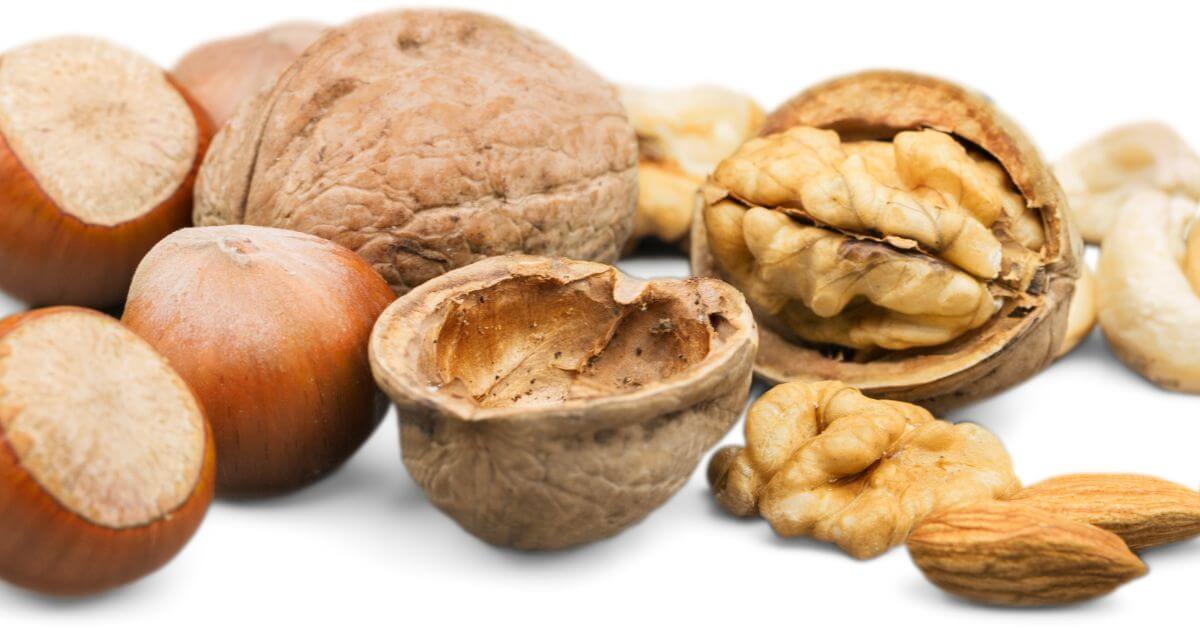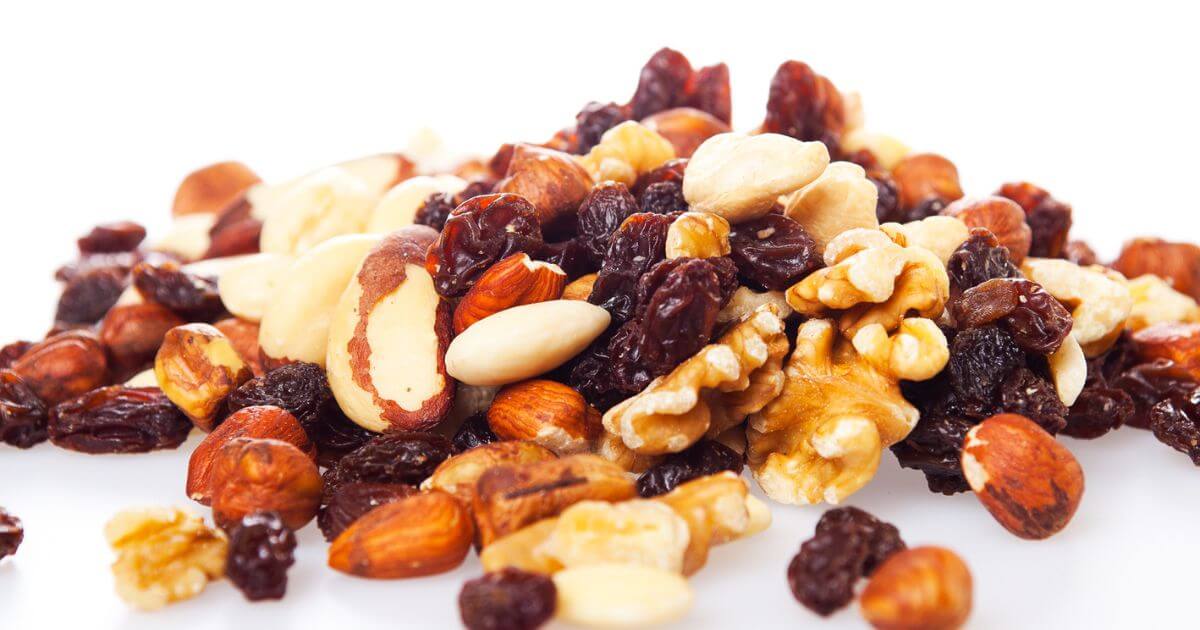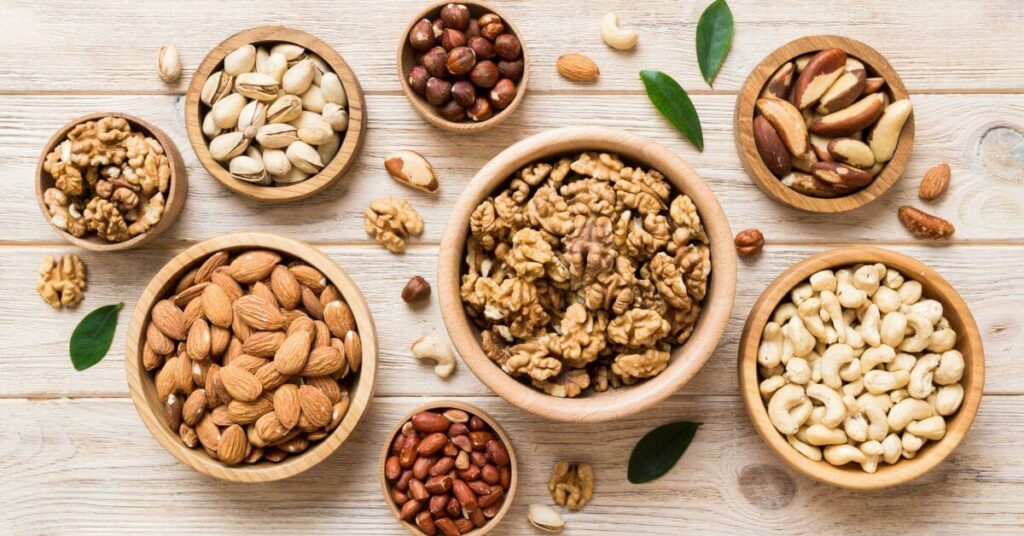Are you following a ketogenic diet and looking for a healthy snack option? Look no further than nuts! Nuts are not only delicious but also packed with essential nutrients and healthy fats. However, not all nuts are created equal when it comes to staying in ketosis. To help you make the right choices, we have compiled a list of the best nuts for a ketogenic diet. So, whether you’re new to the keto lifestyle or need some new snack ideas, read on to discover the best nuts for keto that will keep you on track with your goals.
Low-carb, high-fat ketogenic diets have gained popularity due to their potential for weight loss and numerous health benefits. Nuts are a great source of healthy fats often included in keto meal plans. However, not all nuts are equal regarding their macronutrient profile and suitability for a keto diet.
Table of Contents
How to choose keto-friendly nuts

When following a keto diet, it is crucial to choose the right nuts to ensure they fit into your daily carbohydrate allowance. Several factors should be considered when selecting nuts for a keto diet, such as their carb and fiber content, portion sizes, and avoiding salted and roasted varieties.
Firstly, carb and fiber content significantly determine which nuts suit a keto diet. Nuts low in carbs and high in dietary fiber are preferable as they have a minimal impact on blood sugar levels. For example, almonds, Brazil nuts, macadamia nuts, and pecans are all low in carbs and high in fiber.
Secondly, portion sizes are essential to keep in mind when eating nuts on a keto diet. While nuts are packed with healthy fats and protein, they are also calorie-dense. Consuming nuts in moderation and monitoring portion sizes is advisable to stay within your daily calorie goals. A serving size of nuts is generally about 1 ounce, roughly equivalent to a small handful.
Furthermore, avoiding salted and roasted nuts is vital when following a keto diet. These varieties often contain added oils, preservatives, and high sodium levels, which may hinder your progress on a keto diet and harm your health. Instead, opt for raw or dry-roasted nuts free from additional seasonings.
Top 8 best nuts for keto
The ketogenic diet emphasizes high fat, moderate protein, and low carb intake. This forces your body to burn fats for fuel instead of glucose.
Nuts can be a healthy addition to a keto diet when consumed in moderation. They provide a concentrated source of healthy fats along with plant-based protein, fiber, and important vitamins and minerals.
However, you need to keep net carbs and calories in check when eating nuts on keto. Some nuts align better with keto guidelines than others. Here are the top 10 best nuts for a ketogenic diet and how to incorporate them.
Macadamia nuts
Macadamia nuts top the list as the number one keto-friendly nut. A 1-ounce serving of macadamia nuts contains:
- Calories: 204
- Fat: 21 g
- Carbs: 4 g
- Fiber: 2.5g
- Net Carbs: 1.5g
- Protein: 2 g
Almost 75% of calories from macadamia nuts come from fat, mostly monounsaturated fatty acids. They’re also very low in net carbs and contain no omega-6 fats that can trigger inflammation.
In addition to their low-carb and high-fat content, macadamia nuts can potentially improve cholesterol levels. Studies have shown that consuming macadamia nuts can lead to a decrease in LDL (bad) cholesterol and an increase in HDL (good) cholesterol. This can ultimately contribute to a healthier heart and a lower risk of cardiovascular diseases.
For those following a ketogenic diet, there are various keto-friendly macadamia nut products available. These include macadamia nut milk, butter, and flour. Macadamia nut milk is a suitable alternative to dairy milk, providing a creamy texture and a nutty taste. Macadamia nut butter is another option with its smooth and rich texture, perfect for spreading on keto-friendly bread or adding to smoothies. Finally, macadamia nut flour can be used as a low-carb substitute for traditional flour in baking recipes.
Pecans
Pecans are a close second as a keto superstar nut. One ounce of pecans contains:
- Calories: 196
- Fat: 20 g
- Carbs: 4 g
- Fiber: 2.7 g
- Net carbs: 1.3 g
- Protein: 3 g
Apart from being keto-friendly, pecans are rich in essential nutrients. They are a great source of vitamin B1, magnesium, and manganese, vital for maintaining overall health. Additionally, pecans contain antioxidants, including vitamin E, which prevent oxidative damage and reduce inflammation.
Moreover, pecans can be used as a crispy and flavorful topping for chicken or fish, enhancing the dish’s taste and texture. Coating your protein with crushed pecans creates a keto-friendly crust that adds a delightful crunch without adding unnecessary carbohydrates. By replacing traditional breadcrumbs or flour, pecans provide a low-carb alternative that perfectly complements a ketogenic lifestyle.
Chop pecans and use them to coat fish or chicken before baking; add them to salads or blend them into nut butter. You can also eat a handful of pecans for a satisfying keto-friendly snack.
Walnuts
Walnuts contain key nutrients that make them a top choice for keto diets. A 1-ounce serving provides:
- Calories: 185
- Fat: 18 g
- Carbs: 4 g
- Fiber: 1.9 g
- Net carbs: 2.1 g
- Protein: 4 g
The most notable nutrients in walnuts are omega-3 fatty acids called alpha-linolenic acid (ALA). ALA offers powerful anti-inflammatory properties. It also supports heart and brain health.
Additional benefits of walnuts include:
- Improves mood by reducing symptoms of depression and anxiety.
- High in antioxidants like vitamin E, melatonin, and polyphenols.
- Source of plant-based protein.
Add walnuts to salads and vegetable dishes, make dairy-free walnut milk, or use walnut oil for cooking. Walnuts add great texture and flavor to keto baked goods as well.
Brazil nuts
Brazil nuts are extremely rich in nutrients and healthy fats. Just one ounce of Brazil nuts provides:
- Calories: 186
- Fat: 19 g
- Carbs: 3 g
- Fiber: 2 g
- Net carbs: 1 g
- Protein: 4 g
Brazil nuts stand out for their exceptionally high selenium content – just one nut contains more than 100% of your daily selenium needs. Selenium helps regulate thyroid hormones, acts as an antioxidant, and supports immune function.
Besides their high selenium content, Brazil nuts are also packed with essential minerals such as magnesium, phosphorus, zinc, and copper. These minerals are crucial for maintaining proper bone health, hormone regulation, and immune function.
The recommended serving size of Brazil nuts is 1-2 nuts per day, considering their high caloric value. Consuming excessive amounts of Brazil nuts can lead to selenium toxicity, also known as selenosis. Excess selenium can cause various health issues, including hair loss, brittle nails, digestive disturbances, and nerve damage.
Almonds
Almonds are a powerhouse of nutrition, making them an excellent choice for those following the keto diet. Their low carb content and high healthy fat profile make them a perfect snack to keep you in ketosis while providing numerous health benefits. Here’s what one ounce of almonds offers:
- Calories: 162
- Fat: 14 g
- Carbs: 6 g
- Fiber: 3.5 g
- Net carbs: 2.5 g
- Protein: 6 g
Vitamin E is a notable nutrient in almonds, which protects cells against free radical damage. As part of a healthy lifestyle, antioxidants can reduce inflammation and improve overall health. Additionally, almonds are a good source of copper, a mineral essential for energy production and maintaining proper immune function. Copper also supports connective tissue formation and iron absorption.
Furthermore, almonds are an excellent source of magnesium, which is vital for many processes in the body, including nerve function, muscle contraction, and blood sugar regulation. Adequate magnesium intake is essential for those on the keto diet as it helps prevent muscle cramps and supports heart health.
Almonds add crunch and flavor to a variety of keto foods. Try almond milk, nut butter, or using sliced almonds to top salads, yogurt, and keto-friendly desserts.
Pine nuts
Pine nuts, the edible seeds of pine trees, are highly versatile and widely used in various cuisines around the world. However, they are particularly famous for their role in pesto, an Italian sauce that has gained immense popularity worldwide.
Pesto is a delectable sauce made with a blend of fresh basil leaves, olive oil, parmesan cheese, garlic, and pine nuts. The addition of pine nuts provides a unique flavor and a creamy texture to this sauce, making it a favorite among pasta lovers.
Pine nuts are technically seeds but have a similar nutrition profile to nuts. One ounce of pine nuts contains:
- Calories: 191
- Fat: 19 g
- Carbs: 4 g
- Fiber: 1 g
- Net carbs: 3 g
- Protein: 4 g
Pine nuts contain pinolenic acid. This fat may decrease hunger by regulating hormones that affect appetite. These hormones include cholecystokinin (CCK) and glucagon-like peptide-1 (GLP-1).
In one study, 18 overweight women saw a 36% decrease in food intake after consuming 3 grams of concentrated pine nut oil with breakfast compared to a placebo.
More research is needed in this area.
Pine nuts can add flavor to many dishes. Pesto is a keto-friendly sauce for meat or vegetables. These nuts can be eaten raw or roasted as a snack.
Hazelnuts
Hazelnuts, also called filberts, are a nutritious choice for keto diets. Here’s what one ounce of hazelnuts offers:
- Calories: 176
- Fat: 17 g
- Carbs: 6 g
- Fiber: 2.7 g
- Net carbs: 3.3 g
- Protein: 4 g
Now, let’s delve into the specific health benefits of hazelnuts. One notable benefit is their high vitamin E content. Vitamin E, a powerful antioxidant, protects our cells from free radical damage. It also plays a crucial role in maintaining a healthy cardiovascular system.
Heart disease is a prominent concern in today’s society, and incorporating hazelnuts into your diet can be a heart-smart choice. Hazelnuts contain an abundance of vitamin E that reduces the risk of heart disease in several ways.
Firstly, it can lower LDL (bad) cholesterol levels, contributing to plaque buildup in the arteries.
Secondly, vitamin E assists in preventing the oxidation of cholesterol, thereby preventing the formation of artery-clogging plaques.
Lastly, this nutrient reduces the risk of blood clots and promotes healthy blood flow.
Chop hazelnuts and use them to add crunch to fish dishes or salads. You can also blend them into nut butter or enjoy hazelnuts for a tasty, filling snack.
Peanuts
Numerous health benefits are associated with peanuts, which are versatile and nutritious foods. A good source of macronutrients, essential amino acids, and plant-based protein, they are a valuable addition to any diet. One ounce (28g) of raw, unsalted peanuts contains:
- Calories: 166
- Fat: 14g
- Carbs: 6g
- Fiber: 2.4g
- Net carbs: 3.6g
- Protein: 7g
In terms of nutritional value, peanuts contain a balanced combination of carbohydrates, healthy fats, and fiber. They are also a good source of vitamins and minerals, including vitamin E, folate, niacin, and magnesium. Additionally, peanuts are rich in antioxidants, such as resveratrol, which can help reduce inflammation and lower the risk of chronic diseases.
Peanuts are a great plant-based protein source for vegans and vegetarians. In addition to having all nine essential amino acids, they are also a complete protein source. Additionally, peanuts are high in leucine, which is important for muscle recovery and protein synthesis after exercise.
Peanuts and peanut butter are versatile and can be enjoyed in various ways. They can be eaten as a simple snack or added to smoothies, protein shakes, or keto desserts for extra flavor. In savory dishes, they work well in Asian-style sauces such as satay sauce and can provide a satisfying crunch in stir-fries.
Choosing unsalted peanuts and natural peanut butter without added sugar might benefit your health.
Incorporating nuts into a keto lifestyle
Nuts can be enjoyed as part of a healthy ketogenic diet when consumed in moderation. Focus on nuts with the lowest net carbs and calories to stay within your daily limits.
Pair nuts with other nutrient-dense whole foods like non-starchy vegetables, omega-3-rich fish, grass-fed meats, healthy oils, and low-glycemic fruits like berries. This provides a well-rounded ketogenic diet that offers optimal nutrition.
Experiment with different ways to add nuts to snacks, meals, and recipes. Enjoy the many health benefits these tasty nuts provide. Just be mindful of portions to keep your macros in check. Nuts can be the perfect addition to bring both crunch and nutrition into your keto lifestyle.
How to avoid eating too many nuts

Nuts are fantastic snacks packed with healthy fats, vitamins, and minerals. Unfortunately, they can be so delicious that it’s easy to overindulge in the tasty treats! Eating too many nuts at once can easily slow down weight loss due to their high-calorie content. So, how do you make sure you’re enjoying them responsibly?
Here are some ways to avoid overeating nuts:
- Select the amount you want to eat before snacking on nuts. This helps to keep track of the number of nuts that have been consumed across the course of a snack or meal.
- Rather than reaching into the whole packet or container for a handful every time hunger strikes, consider portioning your nut intake into a small bowl for easy tracking.
- Try not to snack on nuts while doing another activity, such as watching TV, reading a book, or doing another activity– this can lead to mindlessly scarfing down more than intended! If there is an urge for more after a determined amount has already been enjoyed, check in with yourself about whether you are actually still feeling physically hungry or if it might be more of an emotional craving.
The bottom line
Including nuts in your daily diet is not a problem if you’re on keto. In fact, certain nuts can be used as delicious and macronutrient-balanced ingredients in many keto-friendly recipes. These recipes can range from trail mixes to meat dishes to cookies. Just make sure to consume controlled portions of high-fat, low-carb options to maintain your ketosis.
